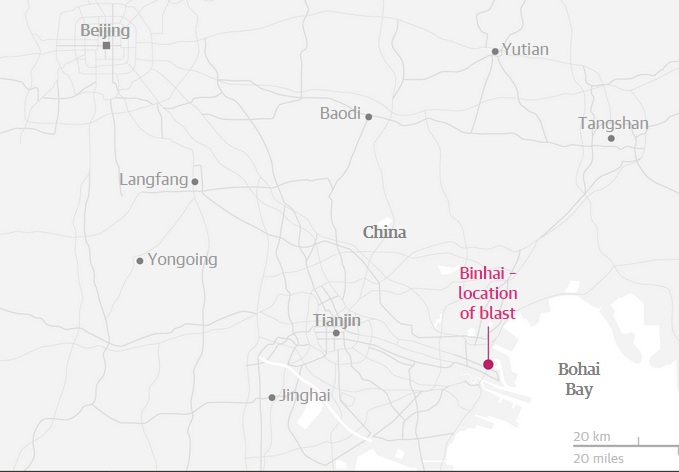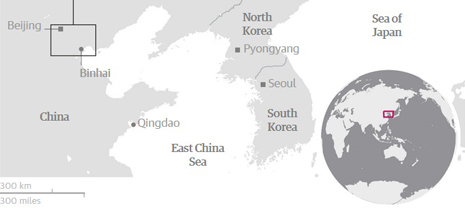A shipment of “dangerous goods” in a warehouse went up in flames shortly before midnight local time (1600 GMT), state media reported, causing explosions so strong that they shook homes on the other side of the city and sent flaming debris arching over nearby high-rise buildings.
Live China blasts: fireball from Tianjin explosions injures hundreds and kills at least 44 – latest updates
Live coverage as huge explosions rock the northern port city of Tianjin
Read more
Hundreds of injured people crowded into hospitals, arriving on foot and by car after emergency services were overwhelmed.
Early Thursday morning China’s President Xi Jinping urged full efforts to rescue those injured inthe blasts, state media said. Xi demanded that authorities quickly control, and extinguish the fire, and “make full effort to rescue and treat the injured and ensure the safety of people and their property”, China Central Television (CCTV) said on its website.
“When the first explosion happened, it felt like a earthquake,” said Chen Bingzhi, who lives about 4km from the explosion site. “The whole building was shaking. I live on the fifth floor and all the windows are broken.”
She heard screaming, then after the second blast hit ran outside without even stopping to lock her front door. Hundreds of people were milling around, many covered in blood. “Many cars were rushing past us and through their windows I could see injured people sitting or lying inside,” she said.
Three or four hundred people arrived at the Tianjin harbour hospital after at least two devastating blasts, the Beijing News reported, quoting an unnamed medic who works there. Many were also injured by flying glass, and one security camera video apparently showed an entire glass door being blown in by the force of the explosion, landing on a man waiting for it to open.
Dawn broke over a battered town, where people who had fled homes near the blast slept on blankets in the street, and photographs showed an abandoned high-rise with many of its windows blown out and piles of debris on the stairs.
Over 280 people were admitted to hospital, and 32 were seriously injured, state television reported. Hundreds had sought treatment for injuries, while uninjured citizens lined up to donate blood.
“The hospital cannot count how many patients we have received – there are too many of them and many of them have burn injuries,” said a doctor at another hospital, who had been called back from a conference in Beijing to treat the injured.


Tianjin is a city of around 7 million people just over 100 kilometers from Beijing, linked to the capital by a high-speed train. It is a major commercial port and a base for petrochemicals, refining and other industries.
The explosions happened just before midnight in an industrial area of the port filled with warehouses and containers, although there are some residential buildings a few hundred meters away.
It triggered secondary explosions and blazes which burned through the night, and were still sending out clouds of black smoke in the morning. Firefighting teams had lost contact with at least two people fighting the fire.
The explosion site was beside to a car warehouse and photos taken early Thursday morning by the Beijing News showed ranks of burned cars lined up in front of a building that had been stripped of doors, windows and contents by the blast.
In the background fire still smoldered, near dozens of fire trucks brought in to fight the blaze, and firefighters picked through the ruins.
The biggest blasts, which took place within 30 seconds, were so strong that they registered at a nearby earthquake monitoring centre. The first blast was equal in strength to the detonation of three tons of TNT, while the second was the equivalent of 21 tons of the explosive, said the China Earthquake Networks Centre.
The US Geological Survey registered a series of seismological actions at a station in Beijing, which is more than 160km from the blast. USGS geophysicist John Bellini said that the equipment often picks up mining blasts, but it is rare to detect seismological activity from surface events like the explosion in Tianjin.
“Blasts that are not mine-related are rare to record, just because they don’t get transferred into the ground very well,” he said.
Bellini said that multiple blasts appeared to have been recorded at the Beijing monitoring facility, and registered between magnitude two and three, but the agency was not completely certain that the activity came from the explosion in Tianjin.
Also, the nature of the blast means that the seismological monitor does not give a completely accurate assessment of the explosion’s magnitude. “I don’t know how much [is] air blast and how much of it is ground vibration,” he said.
Videos posted on social media showed a pillar of flame that dwarfed nearby high-rise buildings, and shook homes several miles away. The blasts ripped offices and homes apart, and sent chunks of masonry flying through the air, pictures showed. One car was crushed by the debris and another was half buried in a crater in the road.
Dazed and bloodied victims ran from the flames, one covered almost head to foot in blood, wearing only his underwear, pictures showed. Another carried a child wrapped in a blanket, another with a stool over his head as a shield from falling debris.
The explosion was in the warehouse of a private company named as Ruihai logistics. A company website says it was established in 2011, has a license for handling hazardous materials and handles around 1 million tonnes of cargo a year.
The government has not yet commented on what caused the blast, but if it is a safety lapse in the handling of dangerous shipments, it would be the latest in a long line of grim accidents.
Poor safety standards and widespread corruption contribute to hundreds of deaths in China’s poorly regulated private mines each year, and in other industrial accidents. An explosion at a fireworks warehouse in July killed 15 people, and last year dozens died in a blast at a car parts factory in Shanghai.

More about:
















































